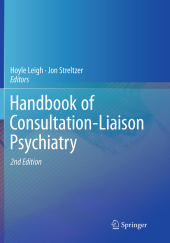 Neuerscheinungen 2016Stand: 2020-02-01 |
Schnellsuche
ISBN/Stichwort/Autor
|
Herderstraße 10
10625 Berlin
Tel.: 030 315 714 16
Fax 030 315 714 14
info@buchspektrum.de |

Hoyle Leigh, Jon Streltzer
(Beteiligte)
Handbook of Consultation-Liaison Psychiatry
Herausgegeben von Leigh, Hoyle; Streltzer, Jon
2. Aufl. 2016. xvi, 561 S. 7 SW-Abb., 10 Farbabb. 254 mm
Verlag/Jahr: SPRINGER, BERLIN; SPRINGER INTERNATIONAL PUBLISHING 2016
ISBN: 3-319-37440-0 (3319374400)
Neue ISBN: 978-3-319-37440-6 (9783319374406)
Preis und Lieferzeit: Bitte klicken
This updated resource refines and expands on both the core concepts and the real-world practice of consultation-liaison psychiatry in medical settings. New and revised chapters provide background and basics and describe CL psychiatry approaches to managing a wide array of common conditions, including heart disease, dementia, anxiety and depressive disorders, alcohol and substance use problems, and chronic pain. Besides the fine points of practice in varied chronic and acute care settings, specific patient populations such as children, elders, ob/gyn patients, and the immunocompromised are discussed. The latest information and insights on pharmacology, interviewing, and ethical and cultural issues round out the book´s highly accessible coverage.
A sampling of topics in the Handbook :
Basic foundations of diagnosis, psychiatric diagnosis, and final common pathway syndromes.
An integrative care model of psychiatry in the primary care setting.
Patient personality, personality types and traits, and disorders.
The chronic patient and the palliative care setting.
Trauma- and stressor-related disorders.
Somatic symptoms and related disorders.
The Second Edition of the Handbook of Consultation-Liaison Psychiatry ably follows its predecessor by presenting the diverse state of the specialty to enhance the work of psychiatrists, clinical psychologists, and primary care physicians.
Part I. General Principles and Approaches: Nature, Evolution, and Practice of Consultation-Liaison Psychiatry.- 1.Consultation-Liaison Psychiatry and Psychosomatic Medicine.- 2.The Functions of CL Psychiatry.- 3.The Why and How of Psychiatric Consultation.- 4.Common Reasons for Consultation and their Management.- 5.Psychiatric Consultation in the Emergency Setting.- 6.Interviewing in Consultation-Liaison Psychiatry.- 7.Basic Foundations of Diagnosis, Psychiatric Diagnosis, and Final Common Pathway Syndromes.- 8.Psychopharmacology in Consultation-liaison Psychiatry.- 9.Integrative Care Model of Psychiatry in the Primary Care Setting.- 10.Systems and Ethical Issues in CL Psychiatry: Hospital as a Social System, Sick Role & Doctor Role, Ethical & Legal Issues.- 11.Cultural Aspects of Consultation-Liaison Psychiatry.- Part II. Syndromes, Disorders, and Treatment in Consultation-Liaison Psychiatry.- 12.Delirium, Alcohol Intoxication and Withdrawal Syndromes.- 13.Neurocognitive Disorders (Dementias).- 14.Anxiety and Anxiety Disorders.- 15.Mood Syndromes : Bipolar and Related Disorders and Depressive Disorders.- 16.Trauma and Stressor-Related Disorders I: Acute Stress Disorder, Posttraumatic Stress Disorder.- 17.Trauma and Stressor-Related Disorders 2: Adjustment Disorders.- 18. Dissociative Disorder.- 19.Psychosis.- 20. Substance Use Problems.- 21.Somatic Symptom and Related Disorders (Psychological Factors Affecting Medical Condition, Conversion, Factitious Disorder).- 22.Chronic Pain.- 23.Somatization, Hypochondriasis (Illness Anxiety Disorder), and Somatization Disorder.- 24. Obsessive Compulsive and Related Disorders.- 25.Patient´s Personality, Personality Types and Traits, and Disorders.- 26.Acute Settings and Conditions: Intensive Care Unit, Heart Disease, Stroke, Seizures.- 27. The Chronic Patient/Palliative Care Settings.- 28.The Kidney Impaired Patient.- 29. The Immune-Compromised Patients- HIV and Organ Transplantation.- 30.The Liver Impaired Patient.- 31.Obstetrics and Gynecology Patients: Menstrual Cycle, Pregnancy, and Postpartum-Related Psychiatric Disorders: Do Hormones Have a Role in Affective State?.- 32.Children and Adolescents.- 33.The Geriatric Patient.- 34.Special Procedures: Intravenous Sedative Interviews, Hoover Test, Hypnosis, Waddell Test.


